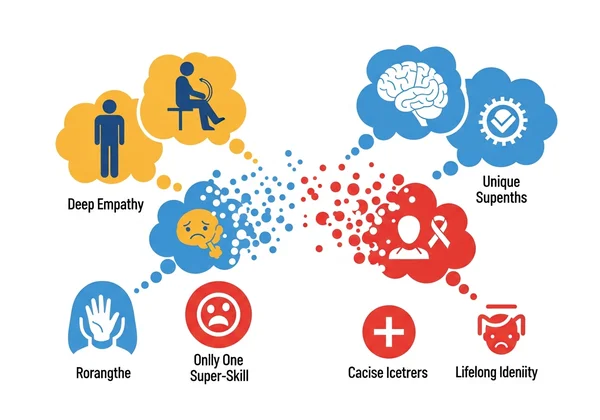AQ Test for Adults: A Parent's Guide to Supporting Your Autistic Child
November 20, 2025 | By Eliza Finch
Navigating the journey of parenthood takes a unique turn when you start to wonder if your adult child might be autistic. This realization can bring a mix of questions, concerns, and a deep desire to understand and support them. If you're asking yourself, How can I support my adult child?, you've come to a place of empathy and compassion. This guide is designed to offer calm, reassuring, and respectful insights into understanding autistic traits in adults, approaching sensitive conversations, and providing support without intrusion. Discover how the aq test can serve as a valuable starting point in their self-discovery journey.

Understanding Autistic Traits in Adult Children
Autism in adulthood can present very differently from the way it's often portrayed in media, which typically focuses on children. Many autistic adults have developed sophisticated coping mechanisms over the years to navigate a world not always designed for them. Understanding these nuances is the first step toward meaningful support.
Recognizing Common Indicators in Adulthood
While every individual is unique, certain patterns of behavior and experience are common among autistic adults. You may recognize some of these in your child:
- Social Communication Differences: This isn't about being "anti-social." It might look like difficulty interpreting body language or sarcasm, preferring direct and literal communication, or finding small talk exhausting. They may have deep, meaningful relationships but a smaller circle of friends.
- Intense, Focused Interests: Often called "special interests," these are passions your child might dedicate significant time and energy to. These interests can be a source of immense joy, knowledge, and even career paths.
- Sensory Sensitivities: Your adult child might be highly sensitive to sounds, lights, textures, or smells. This could mean they avoid crowded places, prefer soft clothing, or are particular about food textures. Conversely, they might be under-sensitive and seek out strong sensory input.
- Preference for Routine and Predictability: A strong need for routine can make life feel safer and less chaotic. Unexpected changes to plans can be genuinely distressing, causing significant anxiety.
- Executive Functioning Challenges: Difficulties with organizing, planning, and starting tasks are common. This can be misread as laziness but is often a challenge related to the autistic brain's processing style.
Dispelling Common Myths About Adult Autism
To truly support your child, it's vital to move past outdated stereotypes. Let's clear up a few common misconceptions:
- Myth: Autistic people lack empathy.
- Fact: Many autistic individuals experience empathy very deeply—sometimes to an overwhelming degree. They may simply express it differently or struggle to interpret how others are feeling from non-verbal cues.
- Myth: All autistic people have "savant" abilities.
- Fact: While some autistic individuals have extraordinary skills in specific areas, this is not a universal trait. Like anyone, they have a unique profile of strengths and challenges.
- Myth: You can "grow out of" autism.
-
Fact: Autism is a lifelong neurodevelopmental difference. It's a fundamental part of a person's identity. People learn, adapt, and grow, but they do not stop being autistic. Understanding this is key to providing authentic support and exploring their neurodiversity. The journey of self-knowledge can be greatly aided by tools like an online autism screening.
-

Approaching Sensitive Conversations and Offering Support
Once you have a better understanding, the next step is communication. This must be handled with care, respect, and a focus on your child's autonomy. Your role is not to diagnose them, but to be a supportive ally if they choose to explore this part of themselves.
Initiating Dialogue with Empathy and Respect
If you feel a conversation is appropriate, timing and tone are everything.
- Choose a Calm Moment: Find a private, low-stress time when you both can talk without interruptions.
- Use "I" Statements: Frame your observations from your perspective. For example, "I've noticed that loud environments seem to be really draining for you, and I was wondering what that's like," is much better than, "You're always overwhelmed in public."
- Listen More Than You Talk: The goal is to open a door, not to deliver a lecture. Ask open-ended questions and give them space to share their own experiences and feelings without judgment.
- Focus on Support, Not "Fixing": Emphasize that you love and accept them exactly as they are. The conversation is about understanding them better so you can be a better parent and support system.
The AQ Test's Role: A Self-Discovery Tool, Not a Diagnosis
During your conversation, your adult child might express curiosity or a desire to understand their traits better. This is where a tool like the Autism Spectrum Quotient (AQ) test can be a helpful, pressure-free resource. It is crucial to frame it correctly.

The AQ test, developed by researchers at Cambridge University, is a questionnaire designed to measure autistic traits in adults. The free aq test on our site provides an immediate score based on 50 questions.
Crucially, you must emphasize this: The AQ test is a screening tool, not a medical diagnosis. It simply provides a data point for self-reflection. A high score suggests the presence of autistic traits and might indicate that further exploration with a professional could be beneficial, but it does not confirm autism. Our platform also offers an optional, AI-powered report that goes beyond the score to offer personalized insights into potential strengths, challenges, and actionable advice, making it a powerful tool for self-discovery. This is an excellent way to understand the results on a deeper level.
Practical Ways to Offer Support Without Being Intrusive
True support respects your adult child's independence. It’s about being a resource, not a manager.
- Ask, Don't Assume: Instead of jumping in to "help," simply ask, "Is there anything I can do to support you with this?" or "What would make this situation easier for you?"
- Respect Their Boundaries: If they don't want to talk about it or explore it further, respect their decision. It's their journey to navigate at their own pace.
- Become an Ally: Learn about neurodiversity and advocate for acceptance. Help create a more accommodating environment when they visit, perhaps by dimming lights, turning down music, or not insisting on long, unstructured social gatherings.
- Offer to Be a Research Partner: If they decide to seek a formal diagnosis or find resources, you can offer to help them research qualified professionals or support groups. You can start by exploring the autism spectrum test together.
Empowering Your Adult Child's Journey: Next Steps for Parents
Your role as a parent is evolving. Supporting your autistic adult child is about shifting from a position of authority to one of a trusted, respectful ally. It's about celebrating their unique mind, validating their experiences, and offering your unconditional love as they navigate their own path of self-understanding.

This journey starts with knowledge and empathy. By learning about adult autism, approaching conversations with care, and understanding the role of tools like the AQ test, you are providing a powerful foundation of support. Encourage their curiosity and empower them to take the lead. Their journey of self-discovery is their own, but knowing you're in their corner makes all the difference. To learn more, direct them to explore a free online aq test.
Frequently Asked Questions for Concerned Parents
Is the AQ test a diagnosis for autism?
No, absolutely not. It is essential to understand that the AQ test is a screening tool, not a diagnostic instrument. It measures the degree of autistic traits an individual possesses. A high score suggests that a person might benefit from a formal diagnostic assessment with a qualified healthcare professional, such as a psychologist or psychiatrist, but it cannot and should not be used as a standalone diagnosis. Consider the score from the AQ autism test as a conversation starter for self-reflection.
How accurate is the AQ test for adults?
The AQ test is a scientifically validated and widely used questionnaire for measuring autistic traits. Its accuracy depends on honest self-reporting. It is a reliable indicator for identifying traits that are common in autistic individuals. However, it has limitations and cannot capture the full complexity of a person's experience. It's best viewed as a reliable, but preliminary, step in a larger journey of self-understanding.
What should I do if my adult child scores high on the AQ test?
First, remain calm and supportive. A high AQ score is simply a piece of information, not a label. Remind your child (and yourself) that this isn't a "bad" result. It's a data point that may help explain lifelong experiences. You can suggest they explore the optional AI-powered analysis for understanding your AQ score for deeper, personalized insights. If they are distressed or curious, you can gently encourage them to consider discussing the results with a therapist or doctor who specializes in adult autism.
How can I best support my adult child's journey toward self-understanding?
The most important form of support you can offer is unconditional acceptance and active listening. Validate their feelings and experiences. Respect their autonomy and let them lead the way—it is their journey. Offer to be a resource, whether that means learning alongside them or helping them find professional support if they ask. Your consistent, non-judgemental presence is the most powerful tool you have.